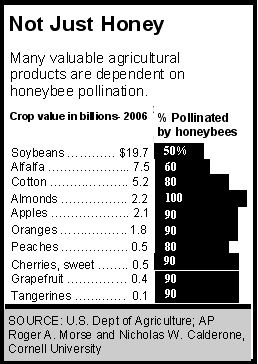Photograph by Danielle Lussier of Lucid Practice.

Without bees, our society would be completely different. An astounding 71% of the hundred crops that provide nine-tenths of the world’s food are pollinated by bees. Bees enable plants to bear fruits and vegetables. Without bees, some fruits and veggies would not be accessible, and we wouldn’t be able to feed livestock effectively.
 Bees also provide us with honey and bee pollen, two resources that are incredibly useful when consumed. Sadly, the average jar of honey you see in the local grocery store has been destroyed by pasteurization methods. It is essentially junk food disguised as health food. But, raw local honey is a superfood loaded with antioxidants, enzymes and vitamins.
Bees also provide us with honey and bee pollen, two resources that are incredibly useful when consumed. Sadly, the average jar of honey you see in the local grocery store has been destroyed by pasteurization methods. It is essentially junk food disguised as health food. But, raw local honey is a superfood loaded with antioxidants, enzymes and vitamins.
Bees collect nectar from the very plants that are making you stuffy and irritated. By eating a spoonful of raw local honey, you’re introducing pollen to the body, thus gradually building up the body’s tolerance to seasonal allergies. Begin consuming raw local honey two months before allergy season for best results.
Raw local honey is loaded with anti+fungal and anti+viral properties.
Ingesting raw local honey raises our insulin slightly and allows tryptophan to enter our brains more easily. Eat a spoonful of honey when feeling anxious or when having trouble sleeping.
Researchers in Russia found: “Honeybee pollen is the richest source of vitamins found in Nature in a single food. Even if bee pollen had none of its other vital ingredients, its content of rutin alone would justify taking at least a teaspoon daily, if for no other reason than strengthening the capillaries. Pollen is extremely rich in rutin and may have the highest content of any source, plus it provides a high content of the nucleics RNA [ribonucleic acid] and DNA [deoxyribonucleic acid].”
In recent years, an alarming trend has begun. Bees are dying off in record numbers (we’re talking millions). Just two months ago, 50,000 bees died in a parking lot in Oregon. The phenomenon known as CCD (Colony Collapse Disorder) has not yet fully been explained but The New Yorker does a great job of laying out the issues in this article. Some of the possible culprits:
I remember being younger and being paranoid of being stung. I would be antsy and upset whenever I saw a swarm of bees. It seems today as though we as a nation take the same approach. We’re very quick to kill bees and we dismiss them as nothing more than a nuisance. Knowing how important bees are to our lives, it seems to be in our best interest to take the opposite approach and start protecting and cherishing bees.
Interestingly, while 15% of the population says they’re allergic to bees, tests have shown that the number is closer to 1%. Can we change these damaging perceptions?
I used to swat bees and kill them without thinking twice. Now, I’m grateful for bees and I’m in awe of nature’s process each time I see one of them pollinate a flower in our garden. What’s the reason for the difference in radically changing my approach? Education.
I simply didn’t realize how important bees are. Education is the key to changing behavior.
It’s paramount that we educate people on the importance of bees. But, how to educate? For one, start by sharing this article with a friend or your network.
Next time you see one of your friends try to swat a bee, bring up the points made in this post and explain their importance.
Bee boxes are homes for bees to create hives in. Purchase bee boxes and place them in the outdoors so bees can flourish. Your garden will also benefit from the increase in pollinators.
eBay auction for a terrific bee box
They’re bad for you, bad for the soil, and bad for the bees.
The more bee friendly plants there are, the more bees there will be. 🙂
Melissa has a great list of plants honey bees like here.
Bees not only provide us with incredible health food products such as raw local honey and bee pollen, but they also pollinate an enormous amount of our crops. Recent estimates state that bees contribute more than $200 billion to the global economy. Bees are mysteriously dying off and no one seems to know about it. There are actions we can take and it starts with being informed and educating. For more information, watch (free on Netflix):
~Stay lucid